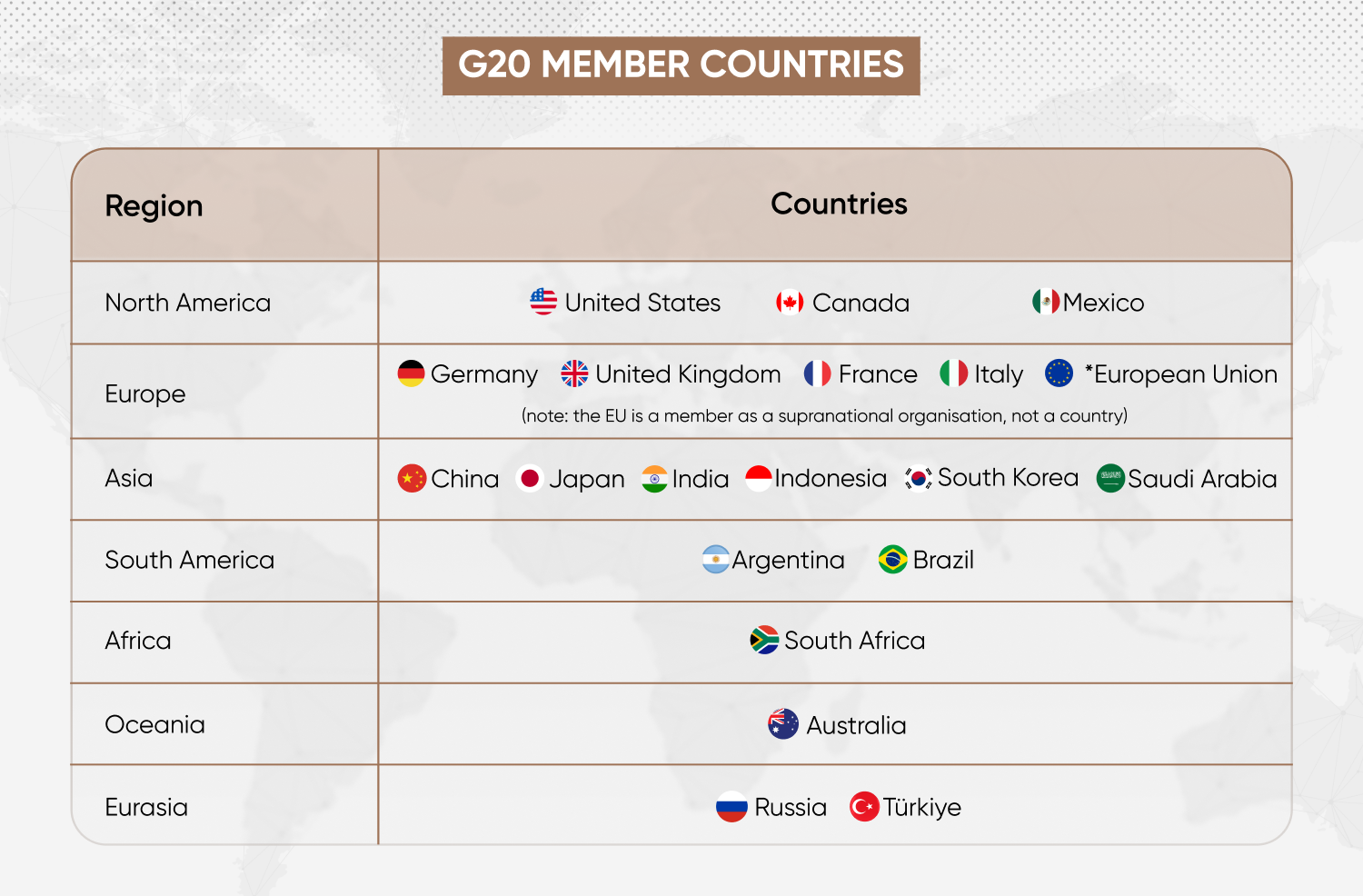What is the G20 and why does it matter?

In today’s interconnected markets, a policy shift in one region can ripple across the globe. Understanding global forums like the G20 – what they are, what they do, and why they matter – can help you anticipate market moves and spot opportunities before they unfold.
Key takeaways
The G20 is a forum of 19 countries plus the European Union representing 85% of global GDP and 75% of international trade, coordinating financial stability and economic policy since its 1999 founding.
G20 decisions aren't legally binding but significantly impact global markets through coordinated actions like pledging $5 trillion in COVID-19 stimulus and endorsing a 15% global minimum corporate tax in 2021.
The forum influences trading opportunities across forex, equities, commodities, and digital assets through policies on financial regulation, trade agreements, cryptocurrency oversight, and central bank digital currencies like CBDCs.
Recent summits directly affect markets: India's 2023 summit helped drive stocks to record highs, while a 2025 emergency summit on US tariffs preceded a sharp market drop that wiped out $1.3 trillion.
The G20 faces challenges reaching consensus among members with divergent interests and lacks enforcement mechanisms, as demonstrated when members couldn't agree on a unified response to Russia's 2022 Ukraine invasion.
What is the G20?
It’s not a political union, but a forum for the world’s largest economies to work together on financial stability, sustainable growth, and coordinated economic policy.
These collaborative efforts can influence global policy direction and affect macroeconomic trends – essential context for traders.
A brief history of the G20
The G20 was founded in 1999, in response to financial crises in the 1990s. Initially a meeting of finance ministers and central bankers, it became a full leaders’ summit in 2008, during the global financial crisis.
List of G20 countries
Together, G20 countries account for around 85% of global GDP and 75% of international trade.

Criteria for inclusion
The G20 doesn’t have a formal application process, and the membership doesn’t change. Originally, the members were selected based on their economic size and geopolitical influence.
G20 presidency and rotation
Each year, one of the G20 member countries holds the summit presidency and sets the agenda. In 2024–2025, South Africa led the G20 with the theme ‘Solidarity, Equality, and Sustainability'.
What does the G20 do?
The G20 shapes the global financial ecosystem by aligning economic policies, coordinating crisis responses, and setting priorities on issues like taxation, trade, and climate change.
Objectives of the G20 summit
Promote economic growth and job creation
Coordinate international financial regulation
Tackle global issues like climate change, food security, and digital infrastructure
Inside the G20 summit: how decisions are made
G20 outcomes aren’t legally binding – they rely on consensus and voluntary implementation by G20 summit countries. However, the summit sets the tone for global cooperation and often guides long-term economic trends.
2024 G20 summit recap: Rio de Janeiro
The 2024 summit in Brazil focused on Building a Just World and a Sustainable Planet. Highlights included:
Global South leadership: Brazil championed inclusion and governance reform, boosting investment flows into emerging markets.
Anti-poverty initiative: 88 nations supported a direct cash transfer programme to fight hunger and poverty.
Institutional reform: renewed efforts to modernise global bodies like the UN, IMF and WTO.
Sustainable investing gained momentum in 2025, driven by G20 commitments and investor interest in ESG themes.
The G20’s impact on markets and trading
Though G20 decisions are not legally binding, they influence the way global policies take shape. Since the pandemic, the G20 has played a more evident and urgent role in stabilising global markets, promoting economic recovery, and responding to rising geopolitical and financial risks.
Market stability
During the COVID-19 pandemic, G20 nations pledged $5tn in stimulus, helping restore investor confidence. Ongoing cooperation on trade, taxation and supply chains supports forex, equities and commodities markets.
Trade agreements
The G20 advocates for multilateral trade systems and has backed agreements like the WTO’s Trade Facilitation Agreement, which reduces trade barriers.
Financial regulation
The G20 has promoted reforms in financial regulation, such as Basel III capital requirements, to improve financial stability.
Digital finance
The G20’s focus on regulating cryptocurrencies and exploring central bank digital currencies (CBDCs) signals potential opportunities in digital asset markets, including trading crypto CFDs.
G20 in action: case studies
In 2023, India hosted the G20 summit. The agenda included policies on sustainable investments, digital transformation and resilient macroeconomic growth, among others. The leaders attending the meeting also discussed policy predictability, which they agreed could ‘help reduce investment risks.’ The stock market rallied to record highs, defying broader global selloffs.
In early 2025, an emergency summit addressed new US tariffs. By March, the US 500 had its sharpest one-day drop in four months, wiping out $1.3tn in market value.
These moments show why flexible, responsive trading strategies matter. Learn more with our day trading strategies guide.
G20 in crisis management
G20’s ability to coordinate cross-border solutions has proven vital, not just during the Covid-19 pandemic, but also in response to global conflicts. For example, energy security talks following the Russia-Ukraine war in 2022 helped avoid major disruptions in energy supply chains in the medium term.
Key achievements of the G20
While not a legislative body, the G20’s coordinated efforts influence market direction, especially in times of uncertainty or transition.
G20 achievements in the 2020s
Global Minimum Corporate Tax (2021): the G20 endorsed a 15% minimum tax on large multinational corporations. This agreement reshaped global tax policy and prompted capital reallocation across jurisdictions, particularly impacting tech and multinational-heavy indices. Explore detailed market guides to get deeper insights into how each asset class moves.
Debt Relief for Low-Income Nations (2020–2022): the Debt Service Suspension Initiative (DSSI) contributed to greater macroeconomic stability in emerging markets (EM). This impacted forex trading in EM currencies.
Green and Inclusive Growth Agenda (2022–2024): the G20 emphasised sustainable development, climate financing, and social equity. These agendas have boosted investor focus on ESG assets, renewable energy stocks, and climate-linked commodities.
Create an account with Capital.com to take advantage of the opportunities provided by the latest G20 reforms.
Criticism and challenges faced by the G20
Among the biggest challenges G20 faces is difficulty reaching consensus. Member nations may have different interests, economic priorities and political systems. Even if some decisions are made, some countries may lack the mechanisms or resources to implement them, while G20 does not have any monitoring or enforcement criteria.
Take Russia’s invasion of Ukraine in 2022. Some G20 members like the US and UK condemned Russia, while some were neutral and others like China and India supported Russia. No decision could be made or enforced.
The future of G20 will be shaped by its ability to overcome these challenges and continue adapting to an evolving global landscape.
FAQs
What is the full form of G20?
G20 is short for Group of Twenty.
Why was the G20 created?
The goal of creating G20 was to promote global financial stability and prevent economic crises through coordinated policy.
How does the G20 affect global trading?
Decisions taken in G20 summit can influence currency valuations, trade flows, and regulatory environments, all of which are key factors for traders.
How often does the G20 summit take place?
It takes place annually, with rotating host countries setting the agenda.
What is the difference between the G7 and the G20?
The G7 includes seven of the most advanced economies, while emerging countries are also a part of the G20.